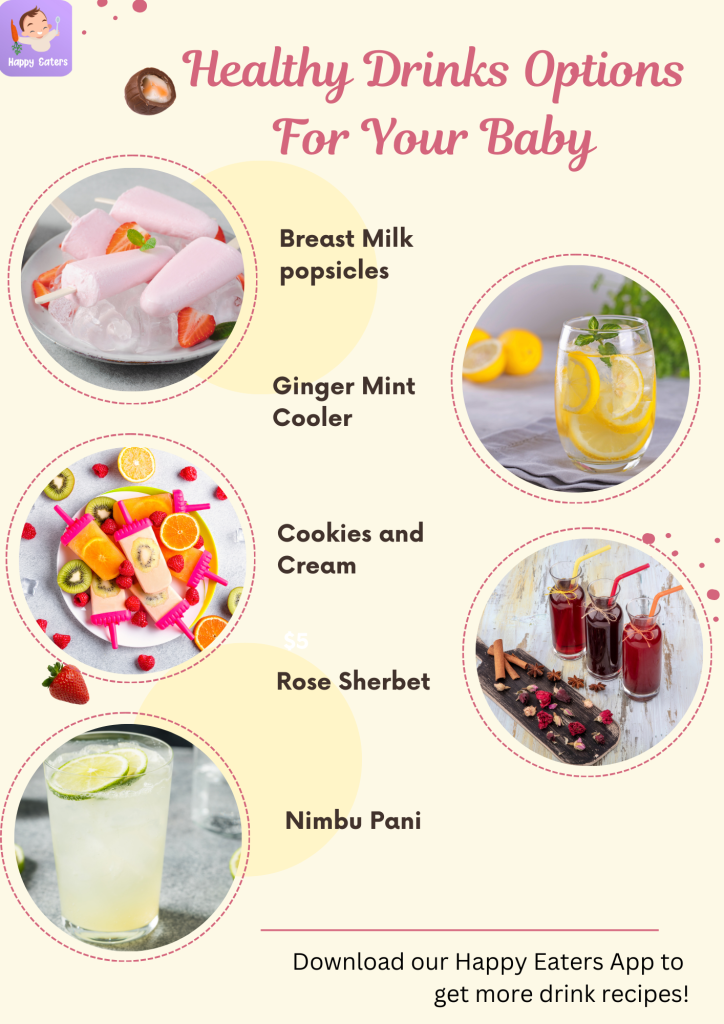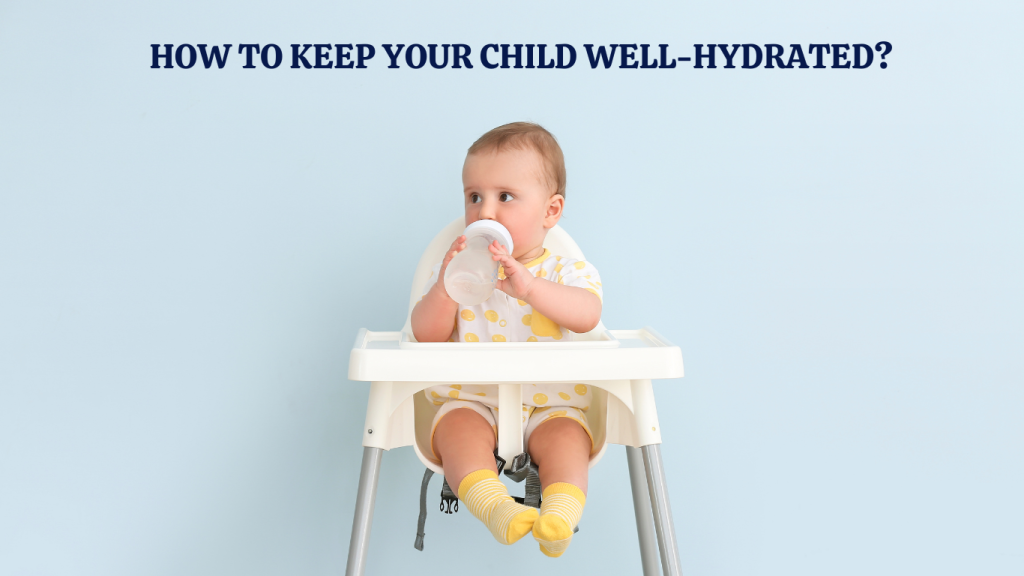Babies should be well hydrated as this plays a huge role in their health and growth during the first year. Hydration helps babies digest food properly, maintain steady energy levels, and stay alert during play. Their bodies need the right amount of fluids to develop strong muscles, keep a healthy temperature, and support brain growth. Water helps move nutrients through the body.
Babies get all their fluid needs from breast milk in their first six months. Around six months, when babies start eating solid foods, they can begin learning to drink small amounts of water.
You can follow this blog’s simple tips on how to introduce water safely during mealtimes and ensure they are well hydrated. Knowing how much and when babies drink water ensures they get enough without reducing their primary nutrition from milk feeds.
Offer Water in Sips After Meals
Starting your baby’s water journey at 6 months is a big milestone. You can begin offering small sips of water right after their solid meals. Babies should drink water from an open cup or a straw cup to help them learn proper drinking skills. It’s best to start with tiny amounts, just 30-60 ml each day until they turn one.
Open cups, sippy cups, straw cups, and training cups work well for teaching babies to drink water.
- Cups with handles let babies hold them better as they learn drinking skills.
- Short cups with wide bases stop spills and make drinking easier.
- Small-sized cups work best since they fit small hands and mouths perfectly.
Babies under one year only need 60-120 ml of water each day to remain well hydrated. Most of their fluid needs come from breastmilk at this age. Too much water can make babies feel full and drink less milk, which gives them important nutrients. You can start with one small sip after each meal and slowly build up the amount as your baby grows. Keep trying even if your baby refuses water at first – they will learn with time and practice.
Include Water-Rich Foods in Their Meals
Water-rich Fruits
You can give your baby fruits like watermelon, cucumber, oranges, muskmelon, strawberries, peaches, plums, pineapples, pears, blackberries, raspberries, and cherries. These fruits help keep your baby hydrated. You can serve these fruits between meals and during snack time to let them meet their daily water needs naturally.
Hydrating Vegetables
You can try giving your baby vegetables like bottle gourd, ridge gourd, snake gourd, ash gourd, ivy gourd, pointed gourd, cucumber, tomatoes, cauliflower, cabbage, lettuce, celery, and eggplant add water to meals.
Observe Signs of Dehydration
Here are the signs of dehydration that you should look out for:
- A dry or sticky mouth means your baby needs water right away. The soft spot on top of your baby’s head should feel flat – if it looks sunken, your baby needs fluids quickly. Dry lips, fewer tears while crying, and cool hands or feet also warn of dehydration.
- A well-hydrated baby usually wets 4-6 diapers each day with clear or light yellow urine. Fewer wet diapers or dark yellow urine can mean your baby needs more fluids.
- A usually cranky or fussy baby might need more fluids. Sleeping more than usual or having a hard to waking up needs quick attention.
You can call your doctor right away if you notice these signs. Quick action helps prevent serious problems from dehydration. You can keep offering fluids often and watch how your baby responds. Most times, catching these signs early helps solve the problem fast.

Offer Breastmilk on Demand
Breastmilk is the main source of hydration in their first year. It provides all the essential nutrition to your baby. Babies know exactly when they need to feed, so letting them nurse whenever they want works best. Most babies feed 8-12 times daily, getting both food and water from each feeding.
When starting solid foods at six months, keep breastfeeding just as often. They learn to eat while getting most of their nutrients from breast milk. Know that, your baby might want to nurse more during growth spurts or when trying new foods.
You should avoid giving cow milk before your baby turns one year old. Young babies can’t digest cow milk properly, and it might hurt their stomachs. Cow milk also lacks the proper nutrients that growing babies need. So you must stick with breastmilk until your baby’s turn first, even when they eat lots of solid foods.
Some babies want more milk during hot weather or when they’re extra active so keep noticing all these signs so you can feed easily when your baby shows hunger signs. This helps keep your baby well-hydrated.
Adjust Fluids for Weather and Activity
During summer, babies need more fluids to stay hydrated. You can offer extra breastfeeds or water sips during summer days and humid weather.
Active babies lose more water through sweat and need extra fluids. After playtime, park visits, or crawling sessions, give your baby something to drink. Sick babies also need more fluids, especially with fever or upset stomach so giving them small and frequent sips works better during these times.
Teething makes babies drool more and sometimes refuse their usual drinks. So you can give them cool water can help soothe sore gums while keeping babies hydrated. You should offer drinks more often during teething, even if your baby takes smaller amounts each time.
Avoid Sugary or Packed Juices
Sugary drinks and packed juices contain extra sugar, artificial colours, and preservatives that may upset your baby’s stomach. These drinks give empty calories without any good nutrients. Even natural fruit juices pack too much sugar for young babies to handle properly. Plus, babies who drink sweet juices often start refusing regular meals and healthy foods. This leads to missing important nutrients they need for growth. These sweet drinks also fill small tummies quickly, leaving no room for nutritious foods like vegetables, proteins, and whole grains.
These can also cause serious dental problems in babies. Sugar from juices sits on newly growing teeth, leading to early cavities and tooth decay.
If you want to give juice, you can give them small amounts of freshly squeezed fruit juice mixed with water. You can keep juice to special times only, not as a regular drink. Water or breastmilk should remain the best source for thirst. You should help them build healthy drinking habits early to help prevent problems with teeth, weight, and eating patterns later.
Happy Eaters helps keep your baby hydrated with many drink recipes for every age. We have hundreds of recipes for:
- Natural Fruit Juices
- Vegetable Smoothies
- Dairy Smoothies
- Soup Recipes
- Simple Drinks
Our recipes come with clear age guides and safety tips. Join our community and download our app to get weekly recipes, expert advice, and tips from other parents and doctors. Our step-by-step guides help you make healthy drinks that your baby will enjoy. Start exploring our collection of baby-friendly drink recipes today and help your little one learn healthy hydration habits that last a lifetime. Visit HappyEaters.club or download our app now to begin your journey toward happier, healthier mealtimes.




